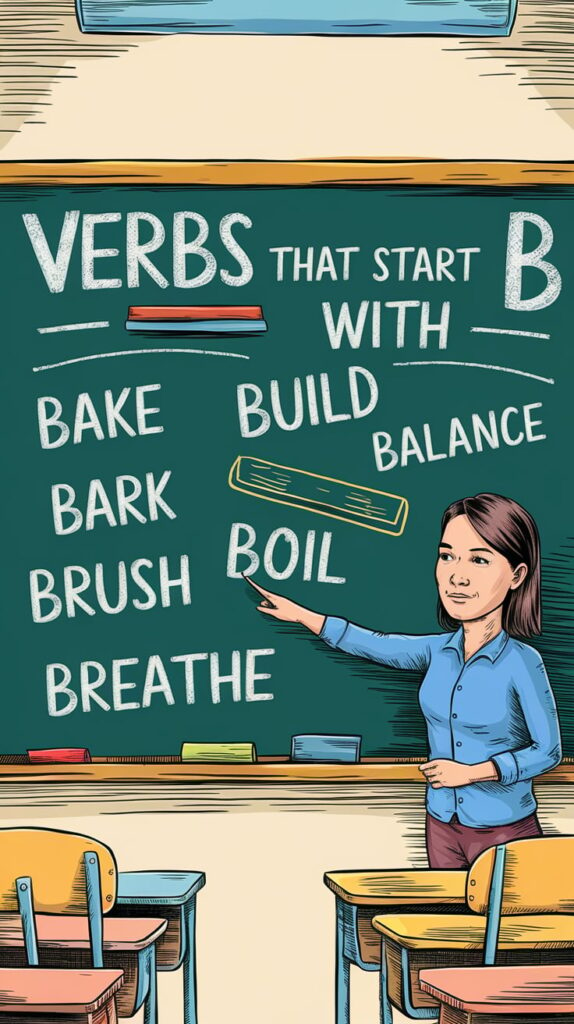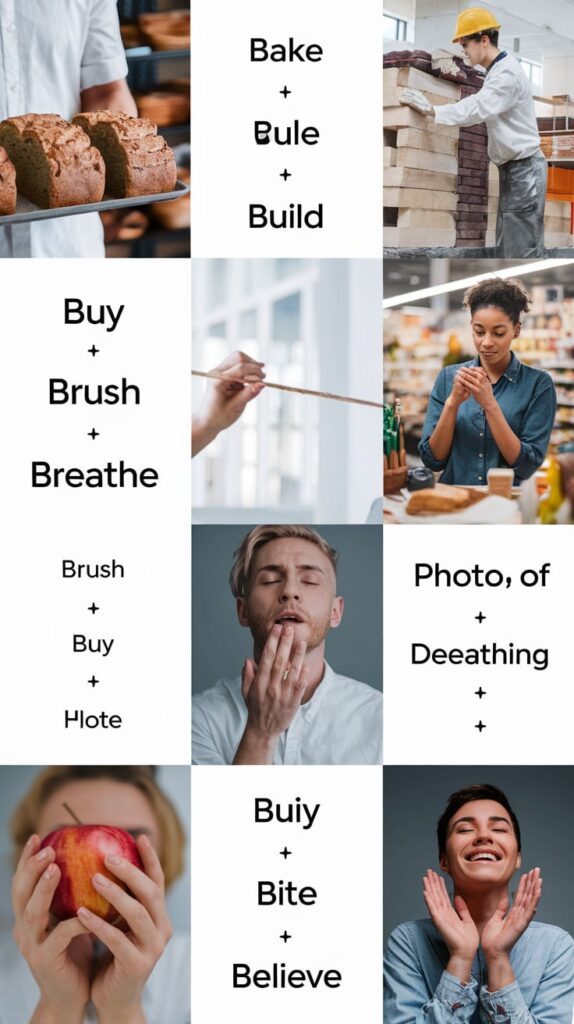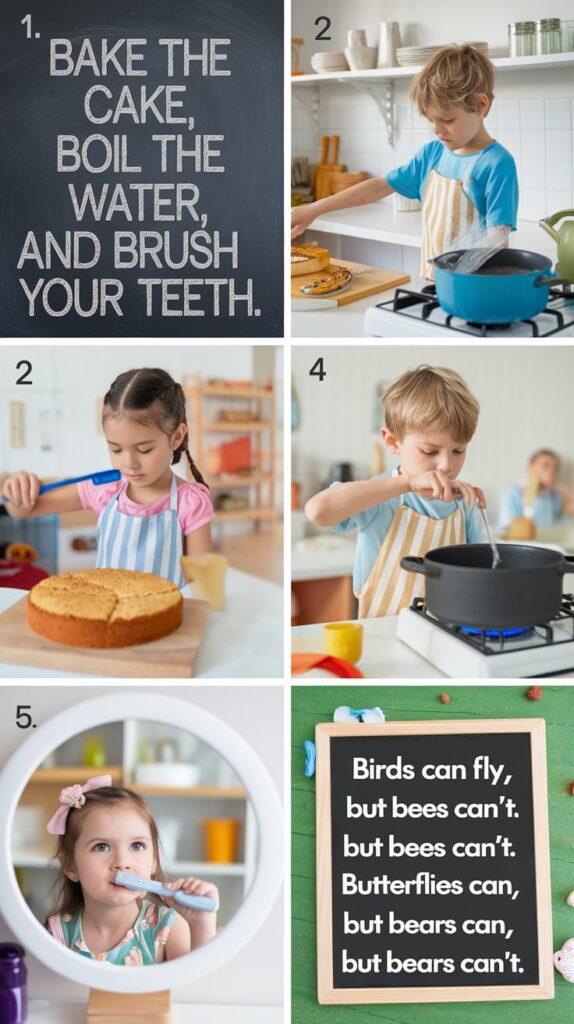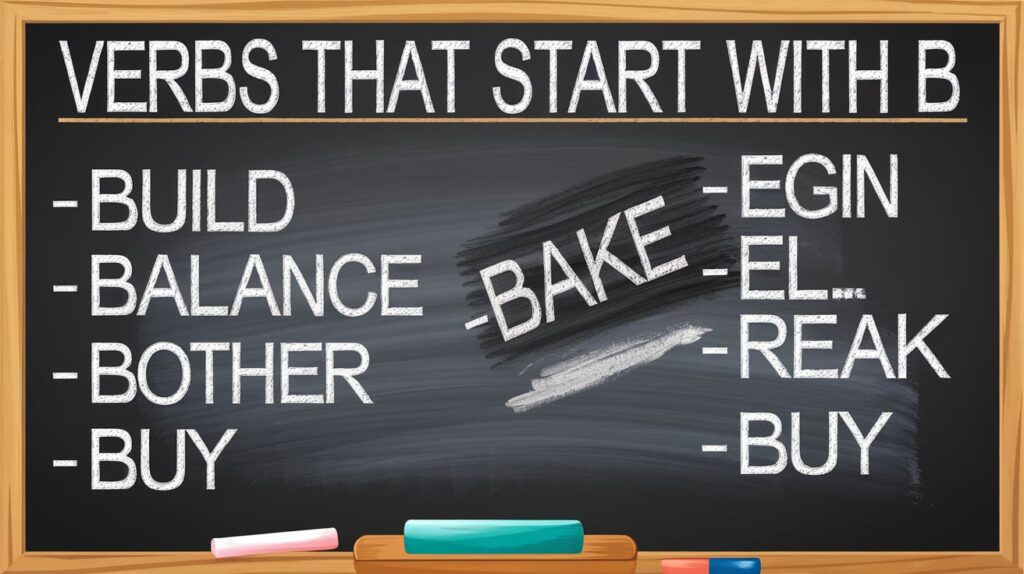Verbs are fundamental building blocks in any language, and when you focus on verbs that start with B, you unlock a rich variety of expressive possibilities.
From common everyday verbs like “build” to more uncommon and specific ones like “befriend”, verbs starting with B offer a versatile toolset for clear and precise communication.
Whether you’re an aspiring writer, a student looking to broaden your vocabulary, or someone simply curious about the beauty of the English language, this comprehensive exploration will provide you with examples, usage tips, and more.
Let’s dive into the world of verbs that start with B and see how they can improve your language skills.
1. Why Verbs Matter in Language

Verbs are the heart of any sentence. They tell you what action is taking place or what state something is in. Without verbs, sentences would be incomplete, leaving them void of meaning.
By mastering verbs—especially ones like those starting with B you can expand your communication and use the language in more creative and precise ways.
Each verb starting with B has its own unique usage and connotation. Whether you’re using action verbs to describe physical activities or state-of-being verbs to explain emotional or mental states, the verbs you choose can significantly affect how you’re understood.
read more : Verbs That Start with R: A Comprehensive Guide – Grammar Beacon
2. Understanding Verbs: Key Components of Communication
Verbs in English can be broadly categorized into several types, each serving a different function. Here’s a breakdown:
- Action Verbs: Describe physical or mental actions.
- State-of-Being Verbs: Indicate existence or a state (e.g., be, become).
- Transitive Verbs: Require a direct object (e.g., build, bake).
- Intransitive Verbs: Do not require a direct object (e.g., breathe, bounce).
- Auxiliary (Helping) Verbs: Used in combination with other verbs to form tenses (e.g., is, are).
Verbs that start with B span across these categories, offering you plenty of variety and options to choose from in conversation and writing. Below, we will dive deeper into action verbs, state-of-being verbs, and more.
3. Action Verbs That Start with B

Action verbs convey movement or activity, and they are usually the most dynamic verbs in any sentence. Here are several action verbs that start with B, including examples of how to use them effectively:
3.1. Bake
Meaning: To cook food in an oven using dry heat.
Example: “She loves to bake fresh cookies every Sunday.”
Usage Tip: This verb is often associated with comfort and home, making it ideal for casual conversation or describing hobbies.
3.2. Bounce
Meaning: To spring back after hitting a surface.
Example: “The ball bounced across the floor and into the corner.”
Usage Tip: Bounce is commonly used in sports or when describing objects that are resilient or elastic in nature.
3.3. Bargain
Meaning: To negotiate the terms of an agreement, usually to get a better price.
Example: “I was able to bargain with the vendor to get a discount on the antique vase.”
Usage Tip: This verb is often associated with markets or sales but can also be used figuratively to describe negotiating anything such as time or resources.
3.4. Build
Meaning: To create or form something by putting parts together.
Example: “They plan to build a new bridge over the river.”
Usage Tip: Build is a versatile verb that can be used in both physical and metaphorical contexts, such as building relationships or building confidence.
3.5. Break
Meaning: To cause something to separate into pieces, or to disrupt continuity.
Example: “She accidentally broke the glass when she dropped it.”
Usage Tip: This verb is incredibly versatile, used both literally (e.g., breaking a cup) and figuratively (e.g., breaking a promise).
4. State-of-Being Verbs Starting with B
While action verbs describe activities or movements, state-of-being verbs describe a condition or state. The most common state-of-being verb is “be,” but there are other useful ones as well. Let’s take a look:
4.1. Be
Meaning: To exist or be in a particular state or condition.
Example: “She will be at the event tomorrow.”
Usage Tip: The verb be is fundamental in English. It’s used in various tenses (e.g., is, am, are, was, were) and is often paired with other verbs to create progressive or passive forms.
4.2. Become
Meaning: To undergo a change or transformation into a different state.
Example: “He will become a great leader in the future.”
Usage Tip: Become is often used to indicate gradual change, such as someone becoming more skilled or knowledgeable over time.
4.3. Belong
Meaning: To be the property or part of something.
Example: “This book belongs to the library.”
Usage Tip: The verb belong is often used in contexts where something is assigned to someone or something, whether it’s a book, person, or idea.
5. Transitive vs. Intransitive Verbs
When using verbs, it’s important to know whether the verb is transitive (requiring a direct object) or intransitive (standing alone). Here’s a look at how B-verbs fit into these categories.
5.1. Transitive Verbs: Action with an Object
Transitive verbs always need an object to complete their meaning.
Examples of transitive verbs starting with B:
- Blame: “I had to blame myself for the mistake.”
- Bet: “She decided to bet $100 on the game.”
- Bend: “He asked me to bend the metal pipe into a circle.”
5.2. Intransitive Verbs: Action without an Object
Intransitive verbs do not require an object to complete their meaning.
Examples of intransitive verbs starting with B:
- Breathe: “He started to breathe heavily after the long run.”
- Blink: “She began to blink rapidly in the bright light.”
- Bounce: “The basketball bounced off the rim and rolled away.”
6. Common Verbs That Start with B

In this section, we’ll explore some common verbs starting with B that you’ll likely encounter regularly. These verbs serve essential functions in both speech and writing.
6.1. Blame
Example: “Don’t blame others for your own mistakes.”
Usage Tip: Often used in contexts of responsibility or accountability, blame is widely used in both everyday speech and formal discussions.
6.2. Bet
Example: “I bet that it will rain tomorrow.”
Usage Tip: Bet can be used literally in gambling or figuratively in making predictions or wagers.
6.3. Blush
Example: “She started to blush when he complimented her.”
Usage Tip: Blush can indicate physical embarrassment or emotional response, often in social contexts.
6.4. Bend
Example: “She asked him to bend down and pick up the paper.”
Usage Tip: This verb can describe both physical movement (e.g., bending over) and figurative actions (e.g., bending the rules).
6.5. Breathe
Example: “Please breathe deeply to relax.”
Usage Tip: Breathe is a natural action we perform every day, and it’s often used in both literal (e.g., breathing during exercise) and metaphorical contexts (e.g., breathing easier after resolving stress).
read more : 30 Other Ways to Say “Let’s Blow This Popsicle Stand” – Grammar Beacon
7. Uncommon Verbs That Start with B
In addition to the more common verbs, English also has several less common B-verbs that can add nuance or flair to your language. Some of these are more specialized but still valuable in enhancing your vocabulary.
7.1. Baffle
Meaning: To confuse or bewilder.
Example: “The complex puzzle baffled me for hours.”
Usage Tip: Often used when describing confusion or perplexity in challenging situations.
7.2. Bequeath
Meaning: To pass down or leave something to someone, especially in a will.
Example: “He decided
to bequeath his fortune to the charity.“
Usage Tip: Commonly used in legal or formal contexts, especially relating to inheritance.
8. Summary Table of Verbs That Start with B
Here’s a handy reference table to summarize the verbs starting with B that we’ve covered in this article:
| Verb | Meaning | Example |
| Bake | To cook food in an oven using dry heat | “She loves to bake cakes on the weekend.” |
| Bounce | To spring back after hitting a surface | “The ball bounced off the wall.” |
| Bargain | To negotiate for a better price | “He managed to bargain for a lower price.” |
| Build | To construct or create something | “They will build a new house next year.” |
| Break | To cause something to separate or stop functioning | “She accidentally broke the vase.” |
| Be | To exist or be in a particular state | “I will be there at 7 PM.” |
| Breathe | To take air into the lungs and expel it | “He had to breathe deeply before speaking.” |
| Blame | To assign responsibility for something | “Don’t blame me for the error.” |
| Bet | To wager money or something else on an outcome | “I bet you can’t beat my score.” |
| Blush | To turn red in the face, usually from embarrassment | “She started to blush when they praised her.” |
read more : Openned Or Opened: Spelling + Examples – Grammar Beacon
9. Conclusion

Verbs that start with B provide endless opportunities for variety and expressiveness in English. They allow us to describe actions, states, and conditions in both everyday communication and more formal contexts.
By incorporating these verbs into your speech and writing, you’ll not only expand your vocabulary but also enhance your ability to communicate more effectively and creatively.
So, whether you’re trying to describe a process (bake), express a condition (be), or reflect on a past event (blame), these verbs will serve as powerful tools in your linguistic toolkit.

James Logan is a seasoned blogger and language enthusiast behind Grammar Beacon. With years of experience in grammar and writing, James shares his expertise through insightful and engaging content. His passion for clear communication and linguistic precision shines in every post, making complex grammar concepts accessible and enjoyable for readers. Follow James for expert advice and tips to refine your writing skills.







